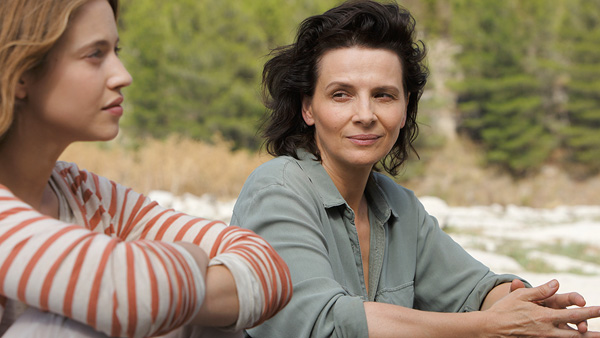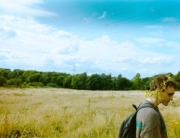
Lou de Laâge, left, and Juliette Binoche in L’Attesa (The Wait) (Alberto Novelli/Oscilloscope Laboratories)
In L’Attesa (The Wait), the main characters in Piero Messina’s loose adaptation of a Luigi Pirandello play do a lot of waiting. So do we. Seven minutes pass before we hear a word of dialogue, and many long silences drag out in a suggestive but dramatically attenuated film. Luckily, ravishing cinematography, gorgeous locations in the Sicilian countryside and the camera’s love for the face of the redoubtable Juliette Binoche help make up for the undernourished story.
Young Jeanne (Lou de Laâge, who burned up the screen as a tormented teen in last year’s Breathe and plays a more conventional ingénue here) heads to her boyfriend Giuseppe’s imposing villa in Sicily expecting to meet him there. He’s not on the premises, but his stoic, quiet mother (Binoche) is. Fragmentary conversations and awkward empty spaces hang between the mother and the girlfriend in Giuseppe’s perplexing absence. The audience knows what Jeanne does not—that Anna is keeping a major secret concerning Giuseppe’s failure to appear. The forbidding family servant creeps about in the background like a Greek chorus or a male Mrs. Danvers. Will the secret be revealed? Or will it hide within another secret? In the meantime, Anna and Jeanne size each other up and play subdued power games as they await their missing prince.
Director Messina uses recurring devices to echo the silence at the movie’s heart. Jeanne leaves answering machine messages for Giuseppe that reveal her up-and-down emotional state and reinforce the unwitting one-sidedness of their communication. Visual metaphors hint at the characters’ solitude. But a certain implausibility surrounding Giuseppe’s absence, emotional as well as logistical, drains the story of potential power. Religious imagery appears throughout but seems more namechecked than incorporated in any coherent way. Binoche’s Anna, who is supposed to be carrying a terrible burden, spends a lot of time looking nobly into the middle distance. Perhaps L’Attesa is invested more in posturing than in empathy for its beleaguered, confused characters.
Though he shows a loose grasp of timing and motivation as a director/storyteller, Messina makes sure that cinematographer Francesco di Giacomo never lets an amazing shot go to waste. L’Attesa’s sumptuous interiors and starkly beautiful landscapes offer perfect settings for his talent. Di Giacomo is a master of chiaroscuro, rich texture, and, above all, framing—wide, tight, whether the camera is moving or still. Lanky shadows offset the movements of isolated figures. Through his lens, all faces take on saintly gravitas, and even a plastic cup rolling on a table feels imbued with talismanic power. The movie is almost too beautiful for its own good. L’Attesa provides a rich feast for the eyes and empty puff pastry for our emotions. But for those who value visuals over structure and meaning—and there are many—that will serve perfectly well.






Leave A Comment